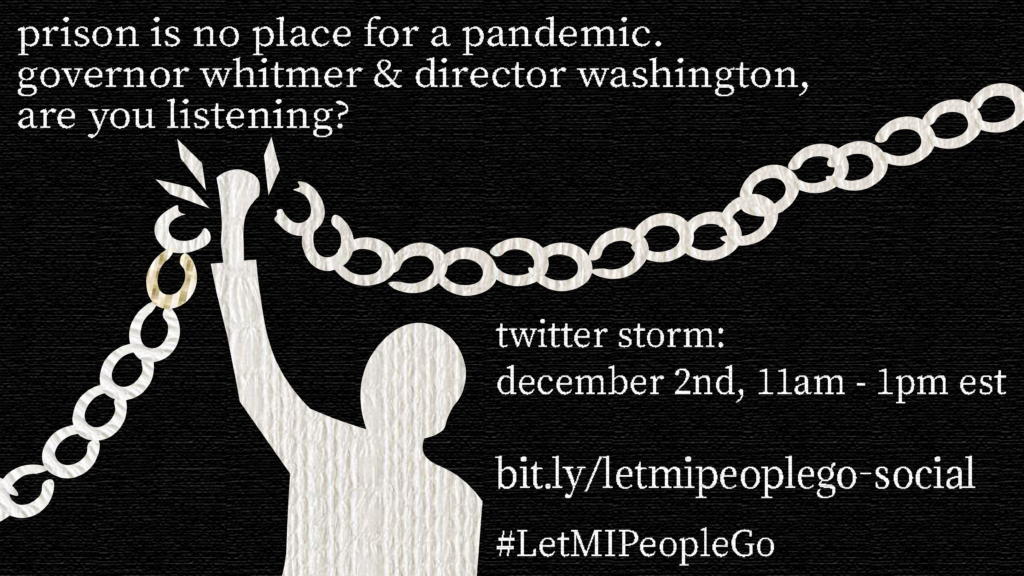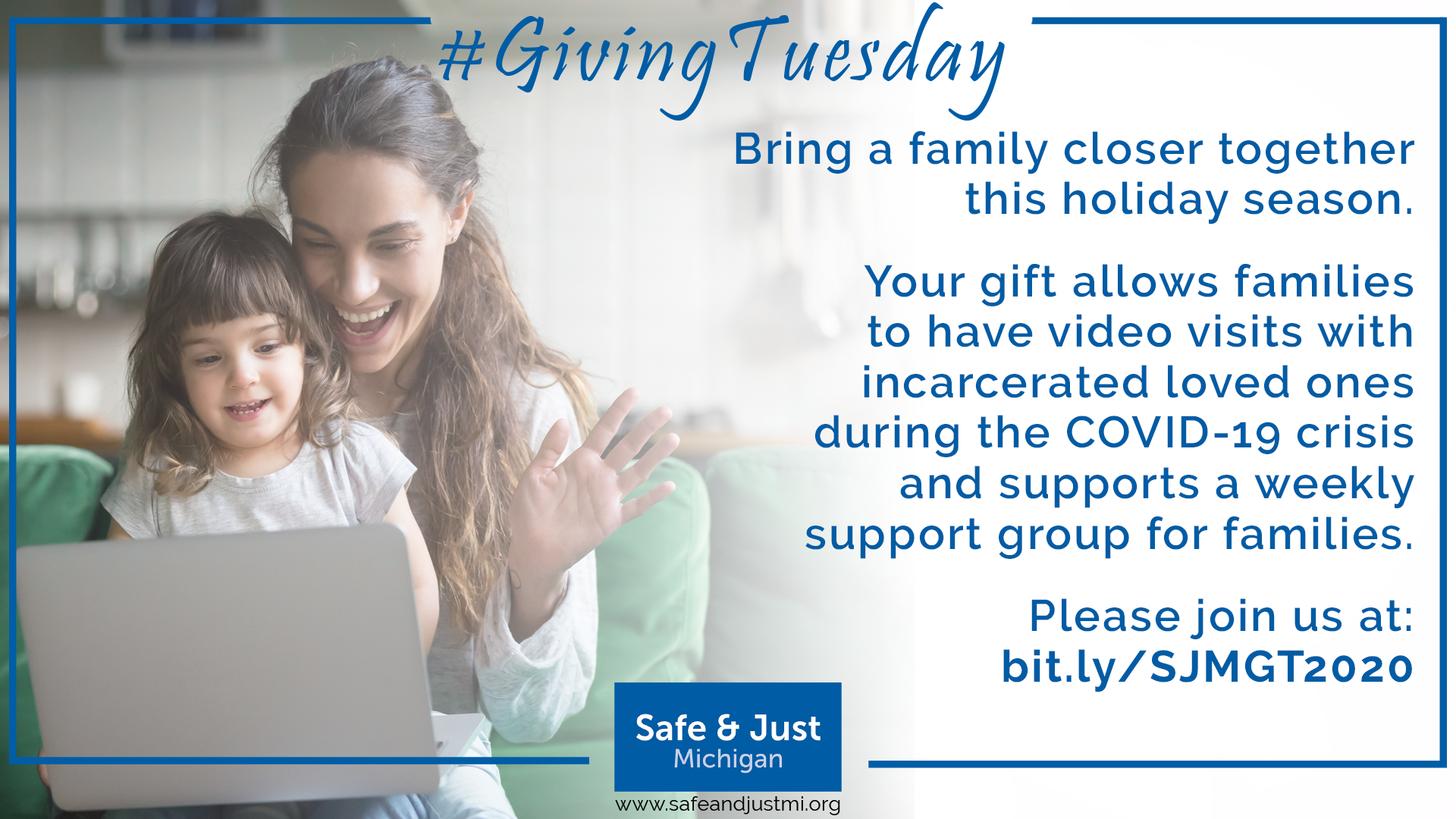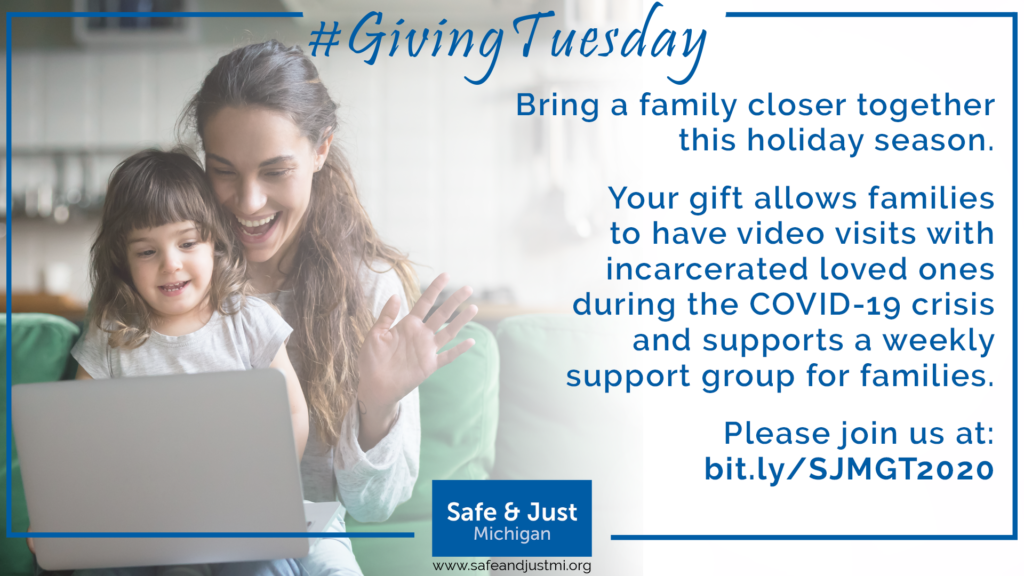Safe & Just Michigan’s mission is to support policy changes that will bring about safer, more just and more equitable communities throughout ours state — including communities that reside within state prisons. However, for the past eight months, COVID-19 has largely been setting the agenda inside our prisons, affecting everything from visits to transfers and paroles.
However, there are ways that you can help — which we’ll get to in just a moment.
Tragically, Michigan has been among the hardest-hit states in the nation during this pandemic, and our prisons have felt a significant impact. Of 39,557 people incarcerated in Michigan prisons who have been tested since the pandemic began — representing the entire incarcerated population — a total of 13,796 had tested positive as of Nov. 29. That results in a test positivity rate of 34.9 percent throughout the course of the pandemic.
For comparison, consider Detroit and Wayne County, which the state of Michigan handles separately for the purposes of COVID-19 testing. This county, which has seen the largest number of COVID-19 cases in Michigan, had tested 1,150,688 people in the same time, or 65.8 percent of the population. (Note: this doesn’t account for people who may have been tested more than once.) Of those tests, 88,306 tests were positive, for a test positivity rate of 7.8 percent — more than 4 times less than the rate inside prisons.
So perhaps it’s not surprising that the number of deaths among people inside Michigan prisons has been depressingly high as well. As of Nov. 30, 84 people incarcerated inside Michigan prisons had died, or 0.2 percent of the prison population. In comparison, Michigan overall has lost 9,036 people to COVID-19, which amounts to 0.09 percent of its population of 9,987,000 people — or about half the rate inside prisons.
In response, the state of Michigan and our governor have taking some steps to slow the spread of COVID-19 inside prisons — but not taking other steps that could spare hundreds — if not thousands — of people incarcerated in prison from becoming infected with the coronavirus.
Since it became apparent that COVID-19 would become a pandemic in March, the Michigan Department of Corrections responded with a series of urgent actions intended to stop the spread of COVID-19 among people who are incarcerated and people who work inside prisons. These actions have not always been met with agreement that they accomplish the goal of stopping COVID-19. For instance, the MDOC undertook testing of all people incarcerated in prison, but did not require testing of its employees, who leave prison after their shift, return to their communities to shop, go to restaurants and go home, and then return to work the following day, perhaps bringing the coronavirus with them.
Another change MDOC made was to halt all visitation. This policy change has been incredibly painful to both people who live in the prisons and their friends and family outside. Just being separated without the chance to see one another would be stressful anytime. But to be unable to see each other during a pandemic that is raging inside the prison has been unbearable for many people who are incarcerated and their loved ones alike.
That is why Safe & Just Michigan and AFSC-Michigan Criminal Justice Program started a weekly support group via Zoom for friends and family of people incarcerated in Michigan every Friday from 3-4:30 p.m. We’re grateful to be able to provide this resource to people who need a way to connect with others who understand better than anyone else the stress, worry, heartache and anger they feel. And sometimes, we also get to celebrate a homecoming, graduation or other happy occasion, too. To learn how to take part in the support group, please contact Safe & Just Michigan at info@safeandjustmi.org.
Recently, the MDOC began a pilot program for video visitation — a way of using a Zoom-like program to have video calls between people who are incarcerated and their friends and family. While this is better than no visual contact at all, it has its limitations. There’s no way to hug a spouse or hold a newborn, for instance. What’s more, they cost money. Not only does a family need to have the technology and internet connection needed for the video call, the MDOC also charges for each video call. Many families of people who are incarcerated are already economically strapped, and these additional financial hurdles can place video visitation out of reach.
That’s why Safe & Just Michigan is supporting people who are incarcerated and their loved ones this #GivingTuesday by raising money for the support group and to pay for video visits. Your generous gift will help keep families connected during this incredibly difficult time when families across the country are relying on Zoom and similar video conferencing systems to stay in touch.
When you help families stay in touch, you are doing more than keeping spirits up during a challenging time. Studies have repeatedly shown that maintaining family relationships is correlated to success after prison and lower rates of recidivism. By helping families stay connected, you are helping heal communities.
But we know that for some, tomorrow is too late. The urgency of the COVID-19 crisis demands that immediate action be taken to protect the most vulnerable people who are incarcerated and to lower the risk of spreading infection inside prison. To date, little action has been taken by the governor or Legislature to protect the people who live under the state’s care inside prisons, but that could change at any time Gov. Gretchen Whitmer decides it’s time.
While the governor did ask the parole board to pull forward some paroles, she declined to take further steps, such as waiving Michigan’s “truth in sentencing” requirement during the COVID-19 emergency. If she takes that action, thousands of people inside prison would become eligible for parole or release. That could lower the prison population to the point people could spread out according to CDC guidelines.
With COVID-19 numbers in Michigan climbing once again, we’re taking to Twitter to urge the governor to finally take steps to curb the pandemic inside our prisons. On Wednesday, Dec. 2, from 1-3 p.m., we’ll be participating in a Twitterstorm to #LetMIPeopleGo. We’ll be explaining why taking immediate and effective steps to halt the spread of coronavirus inside Michigan prisons makes sense for the people incarcerated inside them, the people who work there and for the communities that surround them. Viruses don’t obey barbed wire, brick walls or electric fences — a pandemic unchecked inside a Michigan prison poses a public health risk to Michiganders everywhere.
At 1 p.m. on Wednesday, Dec. 2, we invite you to join us on Twitter to explain why it’s important to #LetMyPeopleGo. Be sure to use that hashtag so that others can see what you tweet and share it. And be sure to look tweets others make and share theirs as well. Working together, we can get the topic trending, which can bring it statewide and even national attention. The goal is to make people notice what is happening inside our prisons, to ask questions of people who are in position to make decisions, and to guide them to making better choices that protect all of us.
We hope you’ll join us for #GivingTuesday on Dec. 1 and for the #LetMIPeopleGo on Dec. 2. You can make your gift at http://bit.ly/SJMGT2020. Let’s let people inside Michigan prisons know they’re not forgotten this holiday season.



